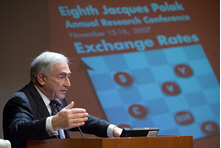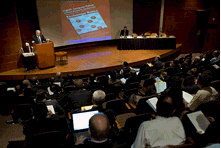ANNUAL RESEARCH CONFERENCE

Typical street scene in Santa Ana, El Salvador. (Photo: iStock)
IMF Survey: Dollar Moving in Right Direction—IMF
November 16, 2007
- Global imbalances can be corrected through "cooperative actions"
- Conference themes include increased macroeconomic interdependence
- Event also seeks to explain phenomenon of asymmetry in exchange rates
Despite its recent significant depreciation against the euro, Managing Director Dominique Strauss-Kahn reiterated November 15 that the U.S. dollar was moving in the right direction.

Strauss-Kahn tells conference exchange rate adjustments in themselves are not enough to address global imbalances (IMF photo)
"The view of the IMF is that the dollar is still overvalued," he said at the opening of the IMF's eighth Jacques Polak Annual Research Conference at the Fund's headquarters in Washington, D.C., which is focusing on exchange rates.
But Strauss-Kahn stressed that "even these kinds of moves are not enough," citing the large U.S. current account deficit. He noted that many people were calling for a further appreciation of the renminbi. However, he cautioned that global imbalances must be dealt with through "cooperative actions" and that exchange rate adjustments in themselves are not enough.
First Deputy Managing Director John Lipsky said a conference on exchange rates was timely, given that "exchange rate movements and currency markets are once again making headlines, in some cases causing world leaders to issue public statements about the value of their country's currency."
The IMF's thinking on exchange rates was taking into account the "rapid and far-reaching changes" in the global economy, such as financial innovation, new patterns in global trade, explosive growth in cross-border private capital flows, and the emergence of developing countries as the drivers of global growth, Lipsky said.
Increasing interdependence
Strauss-Kahn singled out three exchange rate-related themes that are being highlighted at the conference. The first—implications of increasing interdependence—is presented in the paper, "Macroeconomic Interdependence and the International Role of the Dollar." Goldberg and Tille argue in their paper that major countries' monetary and exchange rate policies affect not only themselves and their trading partners but others who value their trade in that currency, he said. "This is especially important for the dollar and the euro," he said.

Event heard IMF surveillance to require sensitivity to country situations, tools to assess exchange rate consistency (IMF photo)
Lipsky noted that with greater international trade, economic activity becomes more sensitive to exchange rates. But more international trade denominated in U.S. dollars had also increased the sensitivity of economic activity to dollar exchange rate movements even in countries that are not trading with the United States, he said.
Determining exchange rates
The second theme—determining exchange rates over time—was of the "highest importance" for the Fund, Strauss-Kahn said. Referring to the 2007 Bilateral Surveillance Decision—which involves the advice (including on exchange rate issues) that the IMF offers its 185 member countries—he said the Fund's surveillance work will require not only sensitivities to a country's circumstances but also solid analytical tools for assessing the consistency of exchange rates. In this context, he underscored the work of the Fund's Consultative Group on Exchange Rates (CGER).
Lipsky described the CGER, which now includes major industrial and emerging market countries, as a cutting-edge analytical tool for conducting bilateral and multilateral surveillance, thanks to work spearheaded over the past two years by the IMF Research Department. He said the scope of the Fund's analytical work on exchange rates was expanding further—it will include issues that affect producers of exhaustible natural resources and some low-income countries that have become important players in the global economy. Progress is also being made on integrating portfolio investment decisions into the CGER framework.
Political economy of exchange rates
On the third theme of the political economy of exchange rates, Strauss-Kahn cited the paper, "Exchange Rate Policy Attitudes: Direct Evidence from Survey Data," by Broz, Frieden, and Weymouth. He said this research can help explain the phenomenon of asymmetry in exchange rates, in which some countries resist currency depreciation and others appreciation.
Continuing on the topic of asymmetry in exchange rate policies, he quoted the concluding words of Jacques Polak's paper, "Fifty Years of Exchange Rate Research and Policy at the International Monetary Fund": "Countries often fail to take action needed to improve competitiveness, but they hesitate to take any action that would reduce it."
Both Strauss-Kahn and Lipsky paid warm tributes to Jacques Polak, including for his important role in shaping the work of the IMF. The conference honors Polak's 70-year career as an economist.







